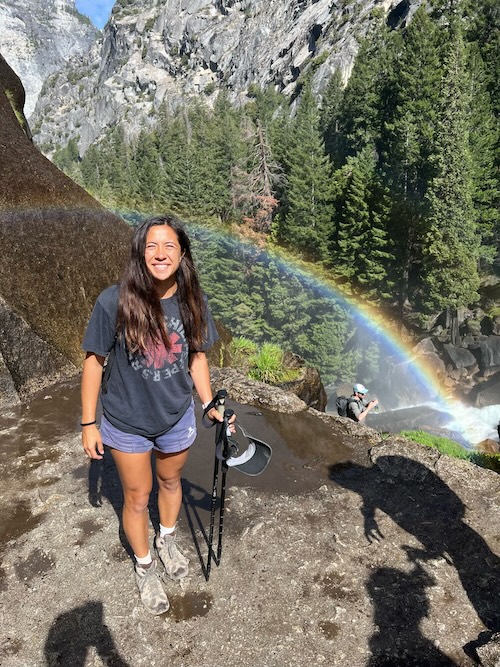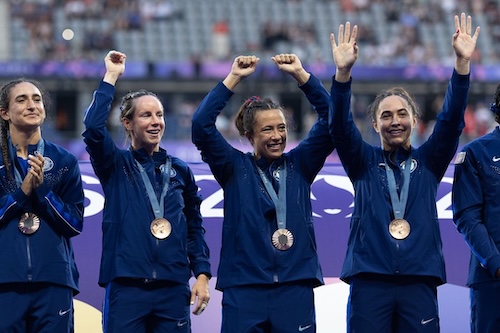
 back to all news
back to all news
Olympian and PitE alum Alena Olsen puts sustainability front and center

It’s a common experience—you come to the University of Michigan with one course of study in mind, but the adventure leads you elsewhere.
Such was the case for Olympic medalist Alena Olsen (BA ’18), who started at U-M thinking she’d become a doctor someday but walked away a rugby player who majored in music studies and biology with a minor in environment.
Olsen says her interest in joining the Program in the Environment (PitE)—a collaboration between the School for Environment and Sustainability (SEAS) and the College of Literature, Science and the Arts—for her minor came after taking just one course about climate change.
 “I took a class at the School of Public Health that talked about climate change, and I realized, people do this type of work for their careers,” says Olsen, adding that she was always the kid who was mushroom hunting in the woods or playing with snakes and frogs by the river near her house.
“I took a class at the School of Public Health that talked about climate change, and I realized, people do this type of work for their careers,” says Olsen, adding that she was always the kid who was mushroom hunting in the woods or playing with snakes and frogs by the river near her house.
What was more unexpected during her undergraduate studies, though, was a chance introduction to rugby—a club women’s sport at U-M—which would set her on a path to becoming a professional athlete and bringing home an Olympic medal from the Paris Olympics in 2024.
Olsen says the experience of working for and winning a bronze medal, a first for rugby sevens in U.S. history, has been “surreal.”
“I don’t know how to explain what it was like. We knew we could get bronze, but it was no guarantee, and we won bronze in the last play of the game. Time was out, we were down, nobody thought we could come back at that point, but one of my teammates had a spectacular play that won us the bronze,” says Olsen, who trains with Team USA in San Diego, California.
Since their big win, Olsen says the attention that the team has gotten has been thrilling and overwhelming.
“Ever since, it has been a parade. It exploded because it was a big moment in the Olympics to win the first U.S. medal for rugby sevens, so the media ran away with it,” says Olsen. “It was wild—full of appearances and interviews. One of my teammates was on Dancing With the Stars, and the team visited the White House.”
Through all this, Olsen hasn’t let go of her interest in issues of the environment, which is why she was thrilled with the opportunity to sign on to be an EcoAthlete. The organization brings together athletes interested in advocating for climate change by prioritizing sustainability.
 “The EcoAthletes organization reached out to us after I posted a video on social media about an initiative we were working on called Global Climate Pledge,” says Olsen. “It was perfect timing for me to find balance between rugby and my other interests by putting energy toward something that I care so much about. Caring about environmental issues didn’t have to be on the back burner, and that was important to me.”
“The EcoAthletes organization reached out to us after I posted a video on social media about an initiative we were working on called Global Climate Pledge,” says Olsen. “It was perfect timing for me to find balance between rugby and my other interests by putting energy toward something that I care so much about. Caring about environmental issues didn’t have to be on the back burner, and that was important to me.”
EcoAthletes' founder, Lew Blaustein, coached Olsen in how climate advocacy and action could be part of her career.
“Lew showed me how I can mend these two sides of me together, and I started having a lot of ideas which he mentored me through,” says Olsen.
Since becoming an EcoAthlete, Olsen has led various initiatives that have ranged from small to big. She has successfully led activities that resulted in the planting of 5,000 trees, brought composting and recycling to the facility where Team USA trains and even organized a community outreach program at a school serving unhoused youth that saw a second life for 200 pounds of equipment like balls, bibs, cones and jerseys.
Although these actions, on the surface, may seem minor, Sara Soderstrom, PitE’s director and associate professor who teaches about sustainability in athletics as part of one of her courses, says athletes are influential, and their behaviors and actions matter.
“Athletes have really powerful platforms and can reach fans about the importance of sustainability in many ways,” says Soderstrom. “This can range from introducing fans to new ideas, such as composting, and showing them concrete steps that can be taken to address environmental issues—these small wins can be so impactful and can help to catalyze larger actions in the long run.”
Soderstrom adds that sports, in general, connect people from different backgrounds, which means that athletes can influence people who wouldn’t otherwise be concerned with environmental issues.
“Olsen is using her platform as a professional athlete to reach fans who may not otherwise think about the environment, and by showing the actions that are possible to help pave the path towards sustainability, she and other athletes can bring these ideas to larger groups of people,” says Soderstrom.
Olsen says that putting energy into addressing environmental issues means she is now pursuing all her passions.
“To aspiring athletes and everyone else, I say aim with everything. Whatever it is you want to accomplish, aim with your thoughts, your actions and your heart,” says Olsen. “For sustainability, I know it’s hard not to be hypocritical in your life—it’s such a big problem to tackle. But even if you have other passions, there are ways to bring sustainability into every part of your life and do things with a sustainable perspective.”

